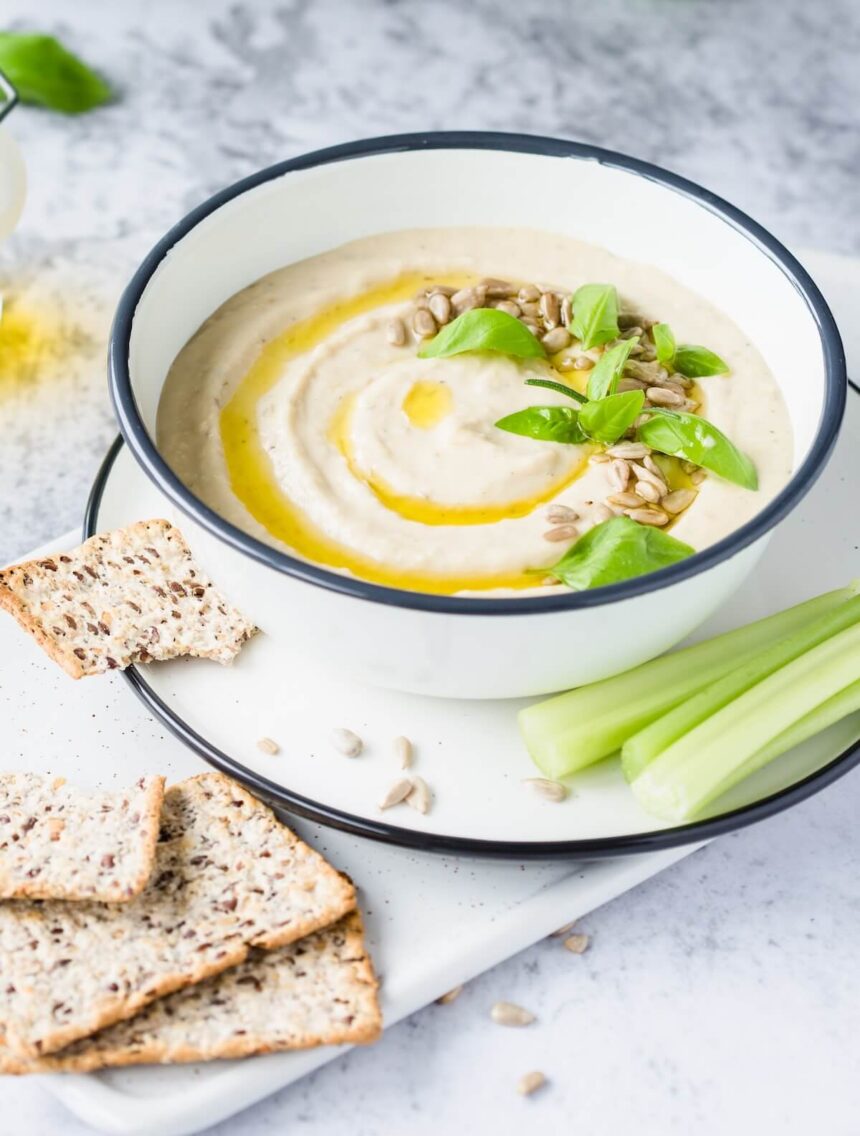We’ve all heard how nuts and seeds can contribute to better health, but sunflower seeds are often overlooked in daily diet. These small yet powerful seeds come with a variety of health benefits, which you can reap by eating less than a handful of sunflower seeds per day.
We talked with four dietitians to learn about sunflower seeds benefits and potential side effects, which you should consider if you’d like to optimize your health by eating sunflower seeds.
Sunflower Seed Nutrition Facts
Sunflower seeds are extremely nutrient-dense, packing impressive mineral and vitamin content in just one ounce.
Here’s a quick overview of sunflower seed nutrition facts according to USDA (per 100 grams of sunflower seeds):
Of course, it looks daunting to see how 100 grams of sunflower seeds contain almost 600 calories or over 50 grams of fat. While it’s true there are many calories in sunflower seeds, it’s unlikely for you to eat 100 grams of sunflower seeds in one sitting.
In most cases, you’re much more likely to sprinkle sunflower seeds on a salad for a little added crunch and a small nutrition boost. Sunflower seeds can, therefore, contribute plenty of health benefits, but there’s no need to worry over the caloric content unless consuming sunflower seeds in excess.
“1 oz of sunflower seeds gives us 165 calories with almost 5.5 grams of proteins, 14 grams of fat, 6.8 of total carbs, half of which is fiber. This serving also has a good amount of vitamin E, magnesium, zinc, selenium, and iron”, as explained by Eva De Angelis, a Licensed Dietitian Nutritionist.
As you see, an average serving packs great nutrition benefits without adding too many calories.
Top Sunflower Seeds Benefits
“Sunflower seeds are one of the most nutritious and delicious snacks you can enjoy. They are packed with healthy fats, protein, fiber, vitamins, minerals, and antioxidants that can benefit your health in many ways,” says Steph Magill, MS, RD, CD, FAND, and the Owner of Soccer Mom Nutrition.
Thanks to a rich nutrition profile, sunflower seeds benefits extend from immune support to heart health. Here are the top five benefits of eating sunflower seeds.
Supports Your Immune System
Some of the main health benefits of sunflower seeds are related to their antioxidant and anti-inflammatory properties, which are derived from their plant compounds, such as phenols, tannins, and saponins.
Sunflower seeds are rich in powerful antioxidants – carotenoids and tocopherols – which can prevent damage caused by free radicals, thus protecting our hearts and brains.
In addition to antioxidants, sunflower seeds are rich in zinc and selenium – two minerals that are essential for fighting infections and preventing oxidative stress, says Magill. “Sunflower seeds can also reduce inflammation, which is linked to many chronic diseases, such as heart disease, diabetes, and cancer,” she continued.
Supports Your Heart Health
If immune support and reduced inflammation don’t sound enough, sunflower seeds may even contribute to your heart health by lowering your blood pressure, cholesterol, and triglycerides.
Michelle Routhenstein, MS RD CDE CDN, and Preventative Cardiology Dietitian at EntirelyNourished.com explains that sunflower seeds contain a heart-healthy fat called linolenic acid. Research shows replacing saturated fat with linolenic acid can reduce total and LDL cholesterol.
That’s not all, though. Some evidence shows that sunflower seeds can help lower cholesterol and triglyceride levels thanks to a compound known as cynarin. One pilot study found that sunflower extract may improve the lipid profile and promote cardiovascular disease prevention.
Therefore, sunflower seeds may seemingly be high in fat, but it’s the kind of fat that may support your health.
Supports a Healthy Digestive System
Catherine Gervacio, Registered Dietician and nutrition writer for ‘Living.Fit’, says that sunflower seeds are a good source of dietary fiber, which is crucial for maintaining a healthy digestive system.
Dietary fiber serves as a prebiotic, promoting the growth and activity of beneficial gut bacteria. A healthy gut microbiota is associated with various aspects of overall health, including immune function and inflammation regulation, in addition to better digestive health.
Helps With Regulating Blood Sugar
The fiber in sunflower seeds supports not only a healthy digestive system, but your blood sugar balance as well.
“The fiber in sunflower seeds can help regulate blood sugar levels by slowing down the absorption of sugar. This is particularly beneficial for individuals with diabetes or those at risk of developing diabetes, as it can contribute to better blood sugar control,” explained Catherine Gervacio.
In addition, sunflower seeds may be effective against diabetes, thanks to plant compounds that inhibit the formation of advanced glycation end products that can cause damage to the body.
Supports Your Skin and Hair
You may have heard how glowing skin starts from the inside out. Well, it couldn’t be more true in the case of sunflower seeds.
Sunflower seeds are rich in Vitamin E, a potent antioxidant that, in addition to promoting immune health, may also support good skin, eye, and hair health.
Thanks to its antioxidant activity, Vitamin E also protects the skin from sun damage and aging, as stressed by Steph Magill.
Side Effects of Eating Sunflower Seeds
As you see, there are plenty of great health benefits to eating sunflower seeds, but it doesn’t mean you should go out and buy a bucketful of sunflower seeds. You may have to consider a few side effects associated with sunflower seed consumption.
Extra Calories and Sodium
Despite all the health benefits associated with sunflower seeds, we can’t forget that they’re still high in calories and fat, so if you consume too many sunflower seeds frequently, you may add extra calories to your diet.
“Sunflower seeds are calorie-dense, so excessive consumption can contribute to calorie intake, potentially leading to weight gain if not balanced with overall dietary needs,” says Catherine Gervacio.
Also, if you choose salted varieties, you may be consuming too much sodium.
Risks Associated With Cadmium
One potential side effect is related to the heavy metal cadmium present in sunflower seeds. Cadmium can accumulate in your kidneys and cause damage if you eat large amounts over a long period of time.
Several studies have noted that sunflower kernels are naturally higher in cadmium compared to other foods. Luckily, research has also found that the cadmium consumed with sunflower kernels didn’t have any adverse effects on healthy men and women.
As long as you keep your sunflower seed consumption reasonable, there’s no reason to worry over the cadmium content either.
Potential Allergic Reactions
Sunflower seeds can cause allergic reactions in some people, especially those who are allergic to other seeds, nuts, or plants in the same family. Sunflower seeds are generally safe to eat, but they may have some side effects if you have certain allergies or sensitivities, so those with known seed or nut allergies may have to stay away from sunflower seeds.
May Interfere With Medications
Gervacio stresses that sunflower seeds may interfere with medications. “Sunflower seeds contain vitamin K, which plays a role in blood clotting. Therefore, when taking anticoagulant medications (blood thinners) such as warfarin, it’s best to maintain a consistent intake of vitamin K to ensure the effectiveness of the medication.”
How to Eat Sunflower Seeds?
To enjoy the benefits of sunflower seeds, eat them in moderation and choose unsalted or low-sodium varieties. The best way to eat sunflower seeds is by eating them raw or roasted, especially without using any salt.
“Sunflower seeds can be added to salads, soups, granola, bread, or other dishes. They can also be turned into sunflower butter and oil for added variety,” recommends Steph Magill.
If you’d like to add a little crunch to your morning yogurt bowl or granola or want to upgrade your lunch salad, sprinkle some sunflower seeds on top of your meal to enjoy all the added health benefits that come with sunflower seeds.








